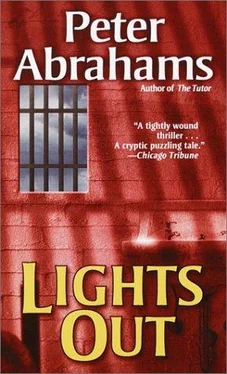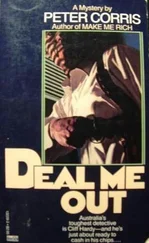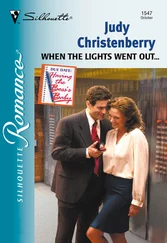Peter Abrahams - Lights Out
Здесь есть возможность читать онлайн «Peter Abrahams - Lights Out» весь текст электронной книги совершенно бесплатно (целиком полную версию без сокращений). В некоторых случаях можно слушать аудио, скачать через торрент в формате fb2 и присутствует краткое содержание. Год выпуска: 2002, ISBN: 2002, Издательство: Fawcett Books, Жанр: Триллер, на английском языке. Описание произведения, (предисловие) а так же отзывы посетителей доступны на портале библиотеки ЛибКат.
- Название:Lights Out
- Автор:
- Издательство:Fawcett Books
- Жанр:
- Год:2002
- ISBN:978-0345445780
- Рейтинг книги:4 / 5. Голосов: 1
-
Избранное:Добавить в избранное
- Отзывы:
-
Ваша оценка:
- 80
- 1
- 2
- 3
- 4
- 5
Lights Out: краткое содержание, описание и аннотация
Предлагаем к чтению аннотацию, описание, краткое содержание или предисловие (зависит от того, что написал сам автор книги «Lights Out»). Если вы не нашли необходимую информацию о книге — напишите в комментариях, мы постараемся отыскать её.
Lights Out — читать онлайн бесплатно полную книгу (весь текст) целиком
Ниже представлен текст книги, разбитый по страницам. Система сохранения места последней прочитанной страницы, позволяет с удобством читать онлайн бесплатно книгу «Lights Out», без необходимости каждый раз заново искать на чём Вы остановились. Поставьте закладку, и сможете в любой момент перейти на страницу, на которой закончили чтение.
Интервал:
Закладка:
“I’m a good packer,” Jack said, strapping on one of the backpacks. Taking the other, he wheeled one of the bikes up the bank.
Eddie unhooked the ax from his belt, unclipped the blade cover. He felt for the notch in the downstream bridge support, then stood back and chopped at the remaining core. In six swings he was through. The bridge made a creaking sound.
Eddie wheeled the other bike up the bank, onto the track. Jack was kneeling there, transferring banded wads of cash from a canvas bag into one of the backpacks.
“Just throw the whole bag in,” Eddie said, taking the other backpack and sticking the ax inside.
“Can’t fit as much in that way, bro,” Jack said. “Should have brought bigger packs.”
“How many have you done?”
“This is the first.”
Eddie looked down the track, saw the dark forms of the bags lying here and there like boulders. “Hurry,” he said.
“How much time have we got?”
Eddie glanced up, saw no lightening of the sky, heard no engine from above. At the airstrip, they would sit in the shelter of the cab until they heard the plane. That was when Julio would climb into the back and see the Mickey Mouse suitcase lying there all by itself. “Just hurry,” Eddie said.
He walked the bike down the track, counting bags and stopping at the last one, planning to work his way back. He removed the backpack, put the canvas bag inside, went on to the next one. The second bag fit comfortably, but he had to take out the ax to jam in the third. Enough.
He looked toward the bridge. Jack was kneeling in the snow, stuffing money into his backpack, a handful at a time.
“Jack. Let’s go.”
“Almost done,” Jack called. He rose, buckled the flap of the backpack, swung it on. He moved toward his bike, noticed another canvas bag, paused over it.
“Jack.”
Jack bent down, opened the bag, grabbed a handful of cash, stuffed it in the pocket of his jacket. Then he filled the other pocket and was shoving more money down the front of his shirt when a light shone on him. He froze in it.
“Jack! Move!”
The truck came barreling around the bend in the track, straight at the bridge.
Eddie swung a leg over his bike. “The bike, Jack.”
Jack took a step toward his bike, then another. He bent, righted it with one hand. The other still clutched a wad of bills. Eddie started toward him.
The truck hit the bridge, moving fast. It was halfway across when Eddie heard the crack, a loud crack, like the sound just before the boom in thunder, and the bridge gave, planks flying through the air like loose piano keys. The truck flew too, but not high enough. The right side of its front bumper caught the top of the bank. The truck flipped, skidded on its side, knocked down a small pine, and came to rest at the edge of the woods, one headlight out, the other shining at a low angle on Jack and the bridge.
Jack gazed at it, raising a handful of money to shade his eyes from the glare. Except for popping-metal sounds, it was quiet in the woods, as though nothing had happened. Things started slowly, slowly enough for Eddie, standing outside the pool of light, to record all the details, details, none of them foreseen.
First Gaucho stepped out of the woods, no longer wearing his cowboy hat but otherwise unharmed. He glanced at the remains of the bridge, at the empty money bags on the road, at Jack. His hand dropped down to his holster.
Eddie shouted, “Shoot him, Jack.”
“Huh?”
“Your gun.”
“He’s just a kid,” Jack said, “playing cowboy.”
Then Gaucho had his pistol out, pointing at Jack. “Pow pow,” he said.
Jack started to smile his smile. Gaucho pulled the trigger. Jack spun around, coughed, coughed again, this time a bloody one, fell and lay still.
Things speeded up. Gaucho turned in Eddie’s direction, fired into the darkness. Something roared from the other side, and a single headlight came into view. The gateman: he’d heard the bridge collapse, heard the crash, heard something. Eddie slipped back into the edge of the woods. Gaucho fired another shot. The bullet smacked into a trunk, not far away. Gaucho on one side, the gateman on the other. Then Julio came limping out of the shadows, carrying a shotgun and changing the geometry.
“He’s dead,” he said in Spanish, thumbing back at the cab.
“So’s this guy,” said Gaucho. “And there’s another-”
The rest was drowned out by the motorcycle, flying toward them. At the last moment, Eddie stepped out of the woods and swung the ax, butt first, into the visor of the driver’s helmet. The impact tore the ax from his hand and knocked him down. He caught a glimpse of the gateman spinning in the air, his machine gun strapped to his back, and the motorcycle somersaulting down into the stream.
Gaucho fired another shot into the darkness.
Then came a blast from the shotgun.
Eddie, the pack on his back all but forgotten, jumped on the bike and pedaled away as fast as he could.
The tires squeaked in the snow. That was the only sound Eddie heard. He concentrated on it all the way to the end of the track and onto the dirt road that led to the steel gate, listening to that squeaking in the snow, shutting out everything else, every sickening image and second thought that tried to force its way into his mind. He almost didn’t see headlights rounding the turn that led to the farm, almost didn’t get off the road and into the trees before a car sped by, with Senor Paz behind the wheel, his round face almost touching the glass. And then, pedaling on, he didn’t immediately notice the milky tones in the sky, or hear the airplane flying in from the south.
He reached the steel gate, tossed over the bike, the backpack, then climbed over himself, strapped on the pack, rode on. The sound of the plane grew louder.
A few minutes later, just as the airplane sound ceased abruptly, Eddie came to Jack’s car. It was easy to see now in the gathering light, backed in between some skinny pines. He got off the bike, threw it in the woods.
Is there another set?
Why would we need another set?
Eddie kicked in one of the rear side windows, opened the door, yanked up the floor mat, found the keys. He unlocked the trunk, dropped the backpack inside, closed it. Then he got behind the wheel, started the car, drove out, onto the dirt road.
He drove. That was all he did. Dirt road to paved two-laner, paved two-laner to the turnpike; where he lost himself in the traffic, flowing slowly in the falling snow. Once or twice he glanced in the rearview mirror, saw only the sights of normal commuting life.
Cold air blew in through the smashed window. Jack’s car had a good heater, and Eddie cranked it up to the max, but there was nothing he could do about that icy feeling on the back of his neck.
Outside: Day 8
27
The clouds disappeared, just like that. The sun came out. The skies were blue. The snow melted. It was spring.
Eddie was too busy to notice. He lit a fire in Jack’s fireplace and burned every scrap of paper in the suite. When the fire was at its hottest, he added all the computer disks. Not knowing how to erase the computer’s internal memory, he unplugged it, unscrewed the back panel, tore out everything that would tear out, and tossed it in the fire too.
The rest-clothes, books, pictures, office equipment-he packed in boxes addressed to Uncle Vic. Then he phoned the desk.
“Mr. Nye is checking out,” he said. “What’s the bill?”
“Checking out? But he just paid his account to the end of the month.”
“Change of plan.”
“I’m afraid we have no prorating mechanism for situations like this.”
Читать дальшеИнтервал:
Закладка:
Похожие книги на «Lights Out»
Представляем Вашему вниманию похожие книги на «Lights Out» списком для выбора. Мы отобрали схожую по названию и смыслу литературу в надежде предоставить читателям больше вариантов отыскать новые, интересные, ещё непрочитанные произведения.
Обсуждение, отзывы о книге «Lights Out» и просто собственные мнения читателей. Оставьте ваши комментарии, напишите, что Вы думаете о произведении, его смысле или главных героях. Укажите что конкретно понравилось, а что нет, и почему Вы так считаете.












